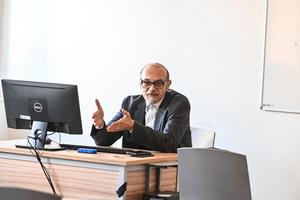Professor Petar Teofilović, a distinguished jurist from the Union University in Novi Sad, former Ombudsman of the Autonomous Province of Vojvodina, visited the Faculty of Public Governance and and International Studies of Ludovika University of Public Service in the framework of the Ludovika Scholars Program. Professor Teofilović, known primarily for his expertise in human and minority rights, in particular the rights of national minorities and the institution of the Ombudsman, captivated the audience with his wide-ranging knowledge and engaging personality.
The workshop, which focused on the role of the Ombudsman in Vojvodina, Serbia and globally, provided participants with detailed and practical knowledge about the challenges faced by the Ombudsman's institutions in their daily work. Professor Teofilović spoke about the complexities of protecting human rights within bureaucratic systems, highlighting the institutional obstacles and political pressures that ombudsman institutions often face. This kind of in-depth analysis is rarely available outside legal circles, making the visit a significant learning opportunity for students and researchers alike.
In his introductory presentation at the workshop organised in the framework of the Ludovika Scholars Program, Petar Teofilović addressed the issues of constitutional law of the ombudsman institution. The professor, who was the first in Serbia to hold the post of Provincial Ombudsman of Vojvodina, illustrated the difficulties that can arise in the work of the Ombudsman by drawing on his own experience and examples from the practice of other countries. Despite the fact that the constitutional legal framework typically guarantees the independence and integrity of the Ombudsman, in practice the institution may face a number of obstacles.
In his presentation, he emphasized the significance of understanding the financial background and internal administrative rules of the ombudsman's office. Without direct influence over these aspects, the parliament or executive power could potentially use them to apply pressure or hinder the ombudsman's work. It is also crucial for citizens not only to be aware of the ombudsman institution but to know that it is accessible to them. The speaker also shared interesting experiences regarding the challenges of collaborating with government bodies and discussed the ombudsman tools that can be employed to influence the executive power. The workshop provided valuable insights into the similar challenges faced by independent ombudsman institutions in Central and Eastern European countries.
Petar Teofilovic gave a public university lecture on the historical-philosophical roots of the international protection of human rights. The attention-grabbing nature of the lecture was demonstrated by the fact that the students asked the speaker a number of questions at the end of the lecture. The warm personality of Professor Teofilović and the direct attention he paid to the audience made his visit memorable, both academically and personally. Participants felt that both the workshop and the lecture contributed significantly to a deeper understanding of the Ombudsman's office, and in particular to the regulatory issues in the local and neighbouring countries’ context.
Text: Ludovika, FPGIS, Department of International Affairs and Department of Training Programmes
Photos by Dénes Szilágyi

